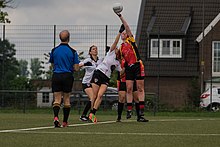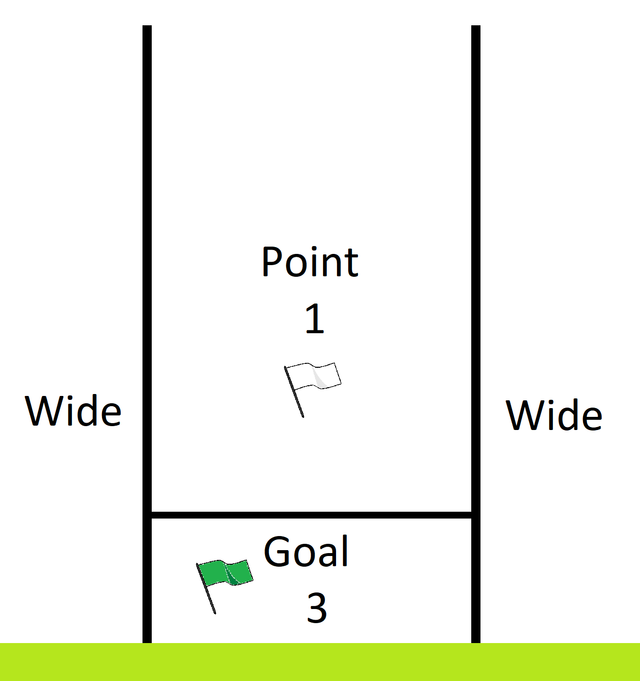Loading AI tools
Women's team sport From Wikipedia, the free encyclopedia
Ladies' Gaelic football (Irish: Peil Ghaelach na mBan) is an Irish team sport for women. It is the women's equivalent of Gaelic football.[1] Ladies' football is organised by the Ladies' Gaelic Football Association. Two teams of 15 players kick or hand-pass a round ball towards goals at each end of a grass pitch. The sport is an all island sport played in all 4 provinces of Ireland ( Ulster, Munster, Leinster and Connacht), where the two main competitions are the All-Ireland Senior Ladies' Football Championship and the Ladies' National Football League. Both competitions feature teams representing the traditional Gaelic games counties.[2][3] The 2017 All-Ireland Senior Ladies' Football Championship final was the best attended women's sports final of 2017.[4][5] The 2019 final, after the 2019 FIFA Women's World Cup Final, was the second largest attendance at any women's sporting final during 2019.[6][7][8][9] Historically Cork and Kerry have been the sport's most successful counties. Waterford, Monaghan and Mayo have also experienced spells of success.[3][10] In more recent years, 2017 to 2020, Dublin have been the dominant team.[8][9][11][12][13]
 Teams representing Germany and Belgium at the Gaelic Euro 2017 – International Football Cup | |
| Highest governing body | Ladies' Gaelic Football Association |
|---|---|
| First played | 1926 |
| Characteristics | |
| Contact | No |
| Team members | 15 on each team |
| Type | Team sport, ball sport |
| Glossary | Glossary of Gaelic games terms |
| Presence | |
| Country or region | Republic of Ireland Northern Ireland |
Ladies' Gaelic football is also played in Africa, Asia, Great Britain, Canada, Europe, South America, the United States, New Zealand and Australia. Outside of Ireland it is mainly, although not exclusively, played by members of the Irish diaspora.[2][3][14] There is also a seven-a-side version of the sport.
| Year | Key events |
|---|---|
| 1926 | A parish league is organised in Cooraclare, County Clare. |
| c. 1964 | In a tournament in County Offaly a team representing Ballycommon defeat a team representing the Marian Hostel from Tullamore in the final. |
| June 1968 | The Dungarvan Gala Festival organise a tournament. |
| July 1969 | The Clonmel Nationalist carries a report of a match featuring teams representing Clonmel Post Office and Tipperary County Council. The following week Clonmel Post Office play a team from the Carrick-on-Suir Exchange. The success of these two fixtures led to the formation of an eight team league. Clonmel Post Office are the inaugural champions. |
| 1970 | A league featuring teams from South Tipperary and West Waterford is played on a double round basis. |
| 1971 | Tipperary and Waterford organise Ladies' Football championships. |
| 3 October 1971 | Tipperary take on Waterford in what was (possibly) the first ever game of inter–county ladies' football.[15][16] Tipperary won by a couple of points. |
| 2 September 1973 | In the first Cork Ladies' Football championship final, Knockscovane defeat Ballydaly by 3–4 to 2–3 at Banteer. |
| 1973 | During a carnival at Banteer, Kerry play Cork in an inter-county game. Kerry won by 5–10 to 4–11 with Mary Geaney scoring 2–6. The match was refereed by Dinny Long, the Cork senior men's footballer. |
| 18 July 1974 | The Ladies' Gaelic Football Association was founded at a meeting held at the Hayes' Hotel in Thurles, County Tipperary, almost ninety years after the Gaelic Athletic Association was founded in the same hotel. |
| 13 October 1974 | In Durrow, County Laois, Tipperary defeat Offaly by 2–3 to 2–2 in the first ever All-Ireland Senior Ladies' Football Championship final. |
| 10 October 1976 | Mary Geaney captains Kerry to their first All-Ireland title. In the final they defeat Offaly by 4–6 to 1–5. With 3–2, Geaney was also the top scorer in the final. She also scores the first ever hat-trick in an All-Ireland final. |
| 1977 | Mullahoran win the inaugural All-Ireland Ladies' Club Football Championship.[17] |
| 1979 | Tipperary win the inaugural Ladies' National Football League title.[18] |
| 1980 | The LGFA introduce their All Star awards.[19][20] |
| 1982 | The LGFA is recognised by the Gaelic Athletic Association |
| 3 October 1982 | Kerry win their second All-Ireland title. They subsequently go on to dominate the championship during the 1980s, winning nine successive titles between 1982 and 1990. Between 1980 and 1991 Kerry also win eleven Ladies' National Football League titles. |
| 12 October 1986 | Kerry defeat Wexford by 1–11 to 0–8 in the first All-Ireland final played at Croke Park. |
| 1987 | Mary Immaculate College defeat University College Cork in the inaugural O'Connor Cup final.[21][22][23] |
| 1987 | A team representing Ballymacarbry, County Waterford win the All-Ireland Ladies' Club Football Championship for the first time. Between 1987 and 1998 they win the title on ten occasions. The club also provides the nucleus of a very successful Waterford team. |
| 11 November 1990 | Kerry defeat Laois by 1–9 to 0–6 to complete a nine-in-a-row of All-Ireland titles. |
| 13 October 1991 | Waterford defeat Laois by 5–8 to 3–7 as they win their first All-Ireland title. As of 2019, this is the highest number of goals scored in a final. Between 1991 and 2000, Waterford reached nine All-Ireland finals, winning five titles. Between 1992 and 2002, they also won five Ladies' National Football League titles. |
| 6 October 1996 | Monaghan, featuring Niamh Kindlon, defeat Laois by 2–11 to 1–9, after a replay, as they win their first All-Ireland title. Between 1994 and 1998, Monaghan played in five successive All-Ireland finals, winning two titles. |
| 3 October 1999 | Mayo, featuring Cora Staunton, defeat Waterford by 0–12 to 1–8 as they win their first All-Ireland title. Between 1999 and 2003, Mayo play in five successive All-Ireland finals, winning four titles. |
| 30 September 2001 | Laois defeat Mayo by 2–14 to 1–16 as they win their first All-Ireland title. Between 1985 and 1996, Laois had played in seven All Ireland finals, finishing as a runner up on each occasion. This was also the first All-Ireland final broadcast live by TG4.[24][25][26] |
| 2 October 2005 | Cork defeat Galway by 1–11 to 0–8 as they win their first All-Ireland title. This marked the beginning of Cork's dominance of the sport. Between 2005 and 2009, Cork were All-Ireland champions five consecutive seasons. They then achieved an All-Ireland six consecutive titles between 2011 and 2016. During this era they also won eleven consecutive Ladies' National Football League titles. |
| 2006 | An Ireland team selected by the LGFA plays against Australia in an International rules series. Ireland won the series, winning the first test by 134–15 and the second test by 39–18.[14][27][28] |
| 26 September 2010 | Dublin win their first All-Ireland title, briefly interrupting the Cork monopoly. In the final they defeat Tyrone by 3–16 to 0–9. |
| December 2014 | The Cork senior ladies' football team win the RTÉ Sports Team of the Year Award after winning their ninth All-Ireland title. They were the first female team to win the award. They received 27% of the vote, beating the Ireland men's national rugby union team, winners of the 2014 Six Nations Championship, by 11%.[29][30][31] |
| December 2015 | Dual Cork football and camogie players, Rena Buckley and Briege Corkery, were named joint winners of The Irish Times/ Sport Ireland Sportswoman of the Year Award after they both broke the record for most individual All-Ireland medals, overtaking the 15 won by the Dublin camogie player, Kathleen Mills.[32] |
| 24 September 2017 | Dublin win their second All-Ireland title, defeating Mayo in the final by 4–11 to 0–11. The attendance of 46,286 was a record for an All-Ireland final. It was also the best attended women's sports final of 2017. The second best attended final was the 2017 FA Women's Cup Final which had an attendance of 35,271.[4][5] It was also the best attended women's sporting event in Europe during 2017.[33] A BBC Northern Ireland report declared it was "the highest attended women's sporting event in the world in 2017".[34] |
| 15 September 2019 | Dublin complete a three-in-a-row of All-Ireland titles, after defeating Galway in the final by 2–3 to 0–4. The 2019 final was watched by a record breaking attendance of crowd of 56,114. After the 2019 FIFA Women's World Cup Final with 57,900, it was second largest attendance at any women's sporting event during 2019. For the seventh consecutive season attendance increased, with the figures more than doubling since 2013.[6][7][8][9] It was also claimed that the record attendance was the largest ever attendance at a women's amateur sporting event in Europe.[35] |

Most of the rules of ladies' Gaelic football are the same as those for the men's game. The main differences are:
Seamless Wikipedia browsing. On steroids.
Every time you click a link to Wikipedia, Wiktionary or Wikiquote in your browser's search results, it will show the modern Wikiwand interface.
Wikiwand extension is a five stars, simple, with minimum permission required to keep your browsing private, safe and transparent.